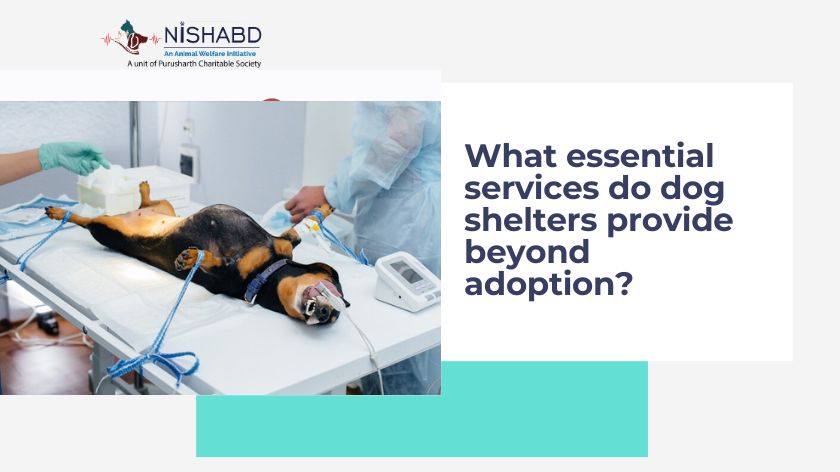What essential services do dog shelters provide beyond adoption?
Shelters for dogs play a crucial part in our local communities, providing many more services than simply shelters for animals to find a new home. They’re a lifeline for many animals, and offer essential services to make a difference to their lives for the dogs in the shelter as well as into the wider community.
This blog will look at the different ways in which shelters help dogs beyond adopting, such as the provision of animal ambulance, medical care and the vital job they perform for street dogs.
1. Animal Ambulance Services
The most crucial services offered by shelters for dogs are the animal ambulance services for dogs. This particular service makes sure that dogs in need get the immediate care they require. If a dog gets injured or sick, or in a crisis an animal ambulance will swiftly transport them to the shelter or a vet’s clinic.
Animal ambulances are outfitted with the necessary medical equipment and a trained staff who provide emergency medical assistance during transport. This is particularly important during emergencies, such as accidents on the road or natural disasters, in which a prompt intervention can significantly impact the recovery of the dog.
2. Veterinary Care
A further important aspect for shelters is veterinary care. Taking care of street dogs is a vital part of a shelter’s mission. Shelter dogs often are diagnosed with health issues ranging from minor to serious illnesses. Shelters offer a wide range of veterinary services to ensure that pets receive the proper medical treatment.
Veterinary care routinely includes check-ups, vaccines, treatments for illnessand operations. Shelters typically have partnerships with local vets or have clinics on site to meet these issues. Through this service they ensure that each dog is in good health and ready to be adopted, which can improve their chances of finding an appropriate home.
3. Taking Care of Street Dogs
Dog shelters are vital in catering to the requirements that street animals have. Street dogs are frequently faced with numerous problems, which include insufficient shelter, food and medical attention. Shelters play a vital function in saving street dogs, giving them the medical care they require and improving their living conditions.
Shelters typically have specific programs to manage the population of street dogs. This could include regular feeding programs, catch-and-release projects and public awareness programs to improve the health of the animals. By meeting the requirements of street dogs shelters are able to reduce their suffering and help prevent the problem of overpopulation.
4. Community Outreach and Education
Beyond the direct care of dogs, shelters also take part in outreach to communities and education. They strive to increase awareness regarding responsible pet ownership practices as well as the importance of neutering and spaying your pet, and the warning signs of abuse to animals. Educational programs usually are targeted at community groups, schools and community occasions to share important information regarding the welfare of animals.
Through education the public shelters are able to stop animals from being entangled in shelters at all. They help communities take better care of their pets, and aid in reducing how many animals are in need of rescue.
5. Fostering Programs
A lot of shelters have foster programs which allow dogs to be housed in temporary residences in the meantime they wait for adoption. Fostering can help dogs adapt to their new surroundings and is particularly beneficial for those who have disabilities or require additional treatment.
Foster homes offer a secure and a warm environment in which dogs receive individual attention and treatment. It also provides shelters with the ability to house other animals that are in need. In addition, foster care providers often help in training and socialization, making the dogs more flexible and ready to move into permanent homes.
6. Adoption Counseling and Support
Finding the perfect pet’s forever home requires more than simply connecting them to an adopter. Adoption counseling and support are two of the most important offerings offered by shelters in order to ensure that placements are successful. Shelters assist prospective adopters in understanding the characteristics and needs of various dogs, helping them to select a pet that is suitable for their lifestyle.
Support following adoption is crucial. Shelters frequently provide guidance regarding training, behavior and health issues to assist new pet owners in adjusting and resolving any issues that may arise. This helps to reduce the chance of returning dogs to shelters and contributes to long-lasting, successful adoptions.
7. Spaying and Neutering Programs
To reduce pet overpopulation, many shelters provide spaying and neutering services. These programs are crucial in stopping unwanted litters and in reducing the number of pets who end up being rescued in shelters.
Shelters usually offer these services at a low or free for pet owners. They can also offer the spaying or neutering process as a part of the process of adoption to ensure that the dogs adopted are well-behaved. This proactive method helps control animals and promotes the responsible ownership of pets.
8. Support for Volunteers and Donations
In the end, dog shelters depend on the help of donors and volunteers to accomplish their mission. Volunteers play an important role in daily operations such as walking dogs to take care of events and other administrative tasks. Donations help fund vet care, maintenance of the shelter and other operating needs.
Shelters typically have programs that recruit and train volunteers in addition to campaigns for fundraising to build the community to involvement. This collaboration helps ensure that shelters continue to provide top-quality care and support for dogs in need.
Comprehensive Care at Nishabd Shelter
Nishabd Shelter offers vital services for stray dogs, providing a safe haven with over 30 kennels for injured and ill animals. Our 24/7 paravet and caregivers ensure they receive medical treatment, post-operative care and rehabilitation therapies. We also provide an ambulance service that picks sick stray dogs all over Delhi NCR, offering medical assistance and returning them when healed.
Taking care of street dogs is our main goal. Every day, our Paravet team provides care to more than 60 dogs at the shelter and in the local area. Nishabd team also delivers therapies like hydrotherapy, physiotherapy, chemotherapy, fluid therapy, blood transfusion.
We work in partnership with Dr. Lal Path Labs for exact testing of our samples. Our foster program assists animals who require postoperative treatment or shelter temporarily. Our team also cooks nutritious, fresh food that is tailored to the dog’s requirements, which aids in speedier recovery.
Conclusion
Dog shelters are more than just places where dogs find new homes; they are vital community resources that offer a range of essential services. From animal ambulance and veterinary care to taking care of street dogs and providing educational outreach, shelters play a critical role in improving the lives of dogs and promoting animal welfare.
By helping shelters by donations, volunteering and increasing the word, we will ensure that these vital services will continue to flourish.

